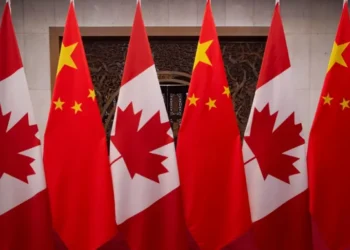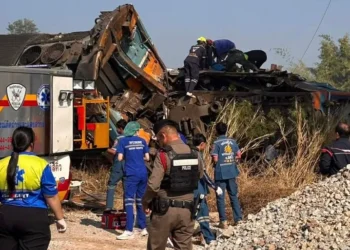As efforts to alleviate suffering in Gaza persist, prioritizing the most effective and cost-efficient means of aid delivery remain paramount.
The U.S. military has finished installing a floating pier for the Gaza Strip, with officials poised to begin ferrying badly needed humanitarian aid into the enclave besieged over seven months of intense fighting in the Israel-Hamas war.
While the pier signifies a potential avenue for aid delivery, its implementation raises pertinent questions about its practicality and impact compared to existing land crossings.
Israel has been widely criticised for restricting crucial humanitarian relief via land routes with hospitals running out of fuel and people desperate for food and water.
As such, aid groups argue that opening land crossings is a better alternative to the pier.
Scott Paul, an Associate Director at Oxfam’s US branch, argued that land crossings could bring in all the needed aid if Israeli officials allowed it, and that the temporary pier “is a solution for a problem that doesn’t exist.”
An Oxfam spokesperson added: “A maritime route and temporary pier will likely cost significantly more and must not replace these far more effective land routes.”
Also, a spokesperson from Islamic Relief said the main barrier restricting the delivery of aid to the people of Gaza “has been the Israeli government, which controls the enclave.”
“The construction of the pier will therefore have very little impact without Israel committing to full humanitarian access,” the spokesperson added.
Farhan Haq, a spokesperson for UN chief Antonio Guterres, reiterated the UN’s preference for land routes, saying “getting aid to people in need into and across Gaza cannot and should not depend on a floating dock far from where needs are most acute”.
He added negotiations are continuing about how the aid would be distributed after the US ruled out any involvement by its troops in the distribution process.
Questions also remain on how aid groups will safely operate in Gaza to distribute food to those who need it most.
Sonali Korde, assistant to the administrator of the US Agency for International Development’s Bureau for Humanitarian Assistance, said, “There is a very insecure operating environment,” and aid groups are still struggling to get clearance for their planned movements in Gaza.
She added that those talks with the Israeli military “need to get to a place where humanitarian aid workers feel safe and secure and able to operate safely. And I don’t think we’re there yet.”
Pressure Mounts On Israel To Halt Rafah Invasion
Safety is now perceived as dependent solely on divine protection as Palestinians find themselves surrounded by intense Israeli bombardment in places like Rafah, Khan Younis, Jabalia, and Nuseirat.
A number of countries, as well as aid groups are mounting pressure on Israel to stop its assault on Rafah.
South Africa’s legal team told the International Court of Justice to order a halt to the hostilities in Gaza was a matter of extreme urgency and that Israel’s actions clearly indicate “genocidal intent.”
Lindiwe Zulu South Africa’s minister of social development stated that the country is returning to the ICJ because it cannot leave its job undone as Israeli attacks intensify in the enclave’s last refuge.
A German news agency also reported that Foreign Ministers from 13 countries have signed a letter warning Israel to halt its ground invasion of Rafah in the southern Gaza Strip and to allow more aid to reach the Palestinian population.
It said that apart from the United States, all other members of the Group of Seven (G7) major industrialised nations signed the four-page letter.
The letter was signed by the foreign ministers of the G7 states: Germany, France, the UK, Italy, Japan and Canada, as well as their counterparts from Australia, Denmark, Finland, the Netherlands, New Zealand, South Korea and Sweden.
In the letter sent to Israeli Foreign Minister Israel Katz, the Ministers called on Prime Minister Benjamin Netanyahu’s government to alleviate the devastating and worsening humanitarian crisis in Gaza by opening all border crossings for aid supplies, including the Rafah crossing with Egypt, which is under Israeli military control.
On Friday, May 17, 2024, the ICJ will hear from Israel, which is likely to defend itself as not commiting any genocide.
READ ALSO: Road Carnage: Expert Sounds Alarm On Reckless Behavior Behind Fatal Crashes























